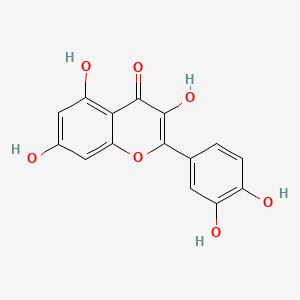quercetin
quercetin is a lipid of Polyketides (PK) class. Quercetin is associated with abnormalities such as Coronary heart disease, Myocardial Infarction, Cirrhosis, Coronary Arteriosclerosis and Vascular ring. The involved functions are known as Vasodilation, physiological aspects, Fermentation, Process and Ingredient. Quercetin often locates in Arterial system, Endothelium, Skin, Endothelium, Vascular and Tissue specimen. The associated genes with quercetin are P4HTM gene, SULT gene, UGT1A1 gene, ARHGAP26 gene and PLXNB1 gene. The related lipids are blood lipid, Promega, Steroids, Phosphatidylserines and Fatty Acids. The related experimental models are Knock-out, Mouse Model, Xenograft Model, Tissue Model and Cancer Model.
References related to abnormalities published in Carcinogenesis
| PMID | Journal | Published Date | Author | Title |
|---|---|---|---|---|
| 11238180 | Carcinogenesis | 2001 | Xing N et al. | Quercetin inhibits the expression and function of the androgen receptor in LNCaP prostate cancer cells. |
| 11408351 | Carcinogenesis | 2001 | Beniston RG et al. | Quercetin, E7 and p53 in papillomavirus oncogenic cell transformation. |
| 12949046 | Carcinogenesis | 2003 | Bacon JR et al. | Sulforaphane and quercetin modulate PhIP-DNA adduct formation in human HepG2 cells and hepatocytes. |
| 15155531 | Carcinogenesis | 2004 | Cheong E et al. | Synthetic and naturally occurring COX-2 inhibitors suppress proliferation in a human oesophageal adenocarcinoma cell line (OE33) by inducing apoptosis and cell cycle arrest. |
| 14688022 | Carcinogenesis | 2004 | Nguyen TT et al. | The role of activated MEK-ERK pathway in quercetin-induced growth inhibition and apoptosis in A549 lung cancer cells. |
| 20044584 | Carcinogenesis | 2010 | Lam TK et al. | Dietary quercetin, quercetin-gene interaction, metabolic gene expression in lung tissue and lung cancer risk. |
| 15661808 | Carcinogenesis | 2005 | Yuan H et al. | Involvement of transcription factor Sp1 in quercetin-mediated inhibitory effect on the androgen receptor in human prostate cancer cells. |
| 18628248 | Carcinogenesis | 2008 | Lin CW et al. | Quercetin inhibition of tumor invasion via suppressing PKC delta/ERK/AP-1-dependent matrix metalloproteinase-9 activation in breast carcinoma cells. |
